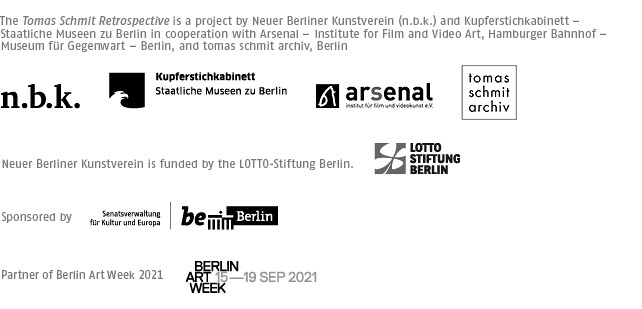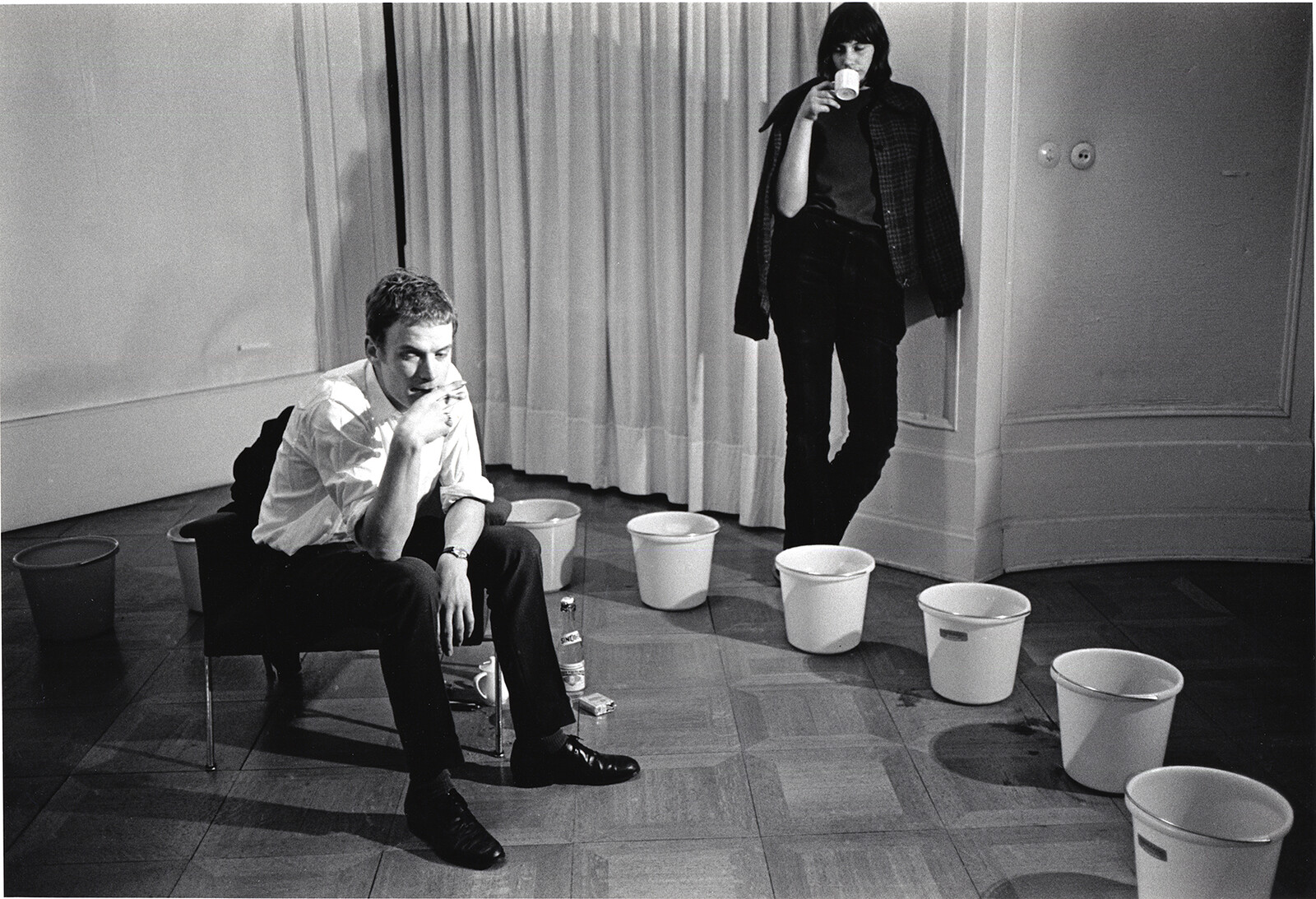Featuring Tomas Schmit, Shilpa Gupta, Barbara Kruger, and Rosemarie Trockel
Chausseestraße 128/129
10115 Berlin
Germany
Hours: Tuesday–Sunday 12am–6pm,
Thursday 12am–8pm
T +49 30 2807020
Tomas Schmit: Pieces, Actions, Documents 1962–1970
September 15, 2021–January 23, 2022
With interpretations and performances by Peter Brötzmann, Nina Canell, Harun Farocki, !Mediengruppe Bitnik, Hajnal Németh, Alexandra Pirici, Gerhard Rühm, among others.
Curators: Marius Babias, Krisztina Hunya
Neuer Berliner Kunstverein (n.b.k.) offers insight into the early work of Tomas Schmit, including his actions, texts, and drawings. With his radical questioning of bourgeois art and his approaches to a new aesthetic interweaving art and life, Schmit played a major role in shaping the Fluxus movement of the early 1960s. Despite being considered one of its pioneers, Schmits early work has received little attention. The exhibition at n.b.k. aims to close this gap. The exhibition features performance pieces by the artist that have never before been shown in their entirety and which defined the early phase of his work. His numerous original scores will be interpreted and performed for the first time. In order to reflect the genre-transcending character of his artistic work beyond the exhibition context, n.b.k. invited artists and musicians, including some of Schmit’s contemporaries, to develop new works that animate visitors to take part in actions, both inside and outside the actual exhibition. The interpretations and performances that were created in response to Schmit’s Fluxus pieces were developed by Peter Brötzmann, Nina Canell, Harun Farocki, !Mediengruppe Bitnik, Hajnal Németh, Alexandra Pirici, and Gerhard Rühm, among others. These will also bring renewed attention to a central theme of the Fluxus movement: the impact of artistic activities on everyday life. Fluxus gave rise to diverse interdisciplinary approaches that paved the way for numerous forms of artistic expression established today, above all performative and collective practices.
A project by Neuer Berliner Kunstvereins (n.b.k.) and Kupferstichkabinett – Staatliche Museen zu Berlin, in collaboration with Arsenal – Institute for Film and Video Art, Hamburger Bahnhof – Museum für Gegenwart – Berlin, and the tomas schmit archiv, Berlin
The exhibition will be accompanied by an extensive performance program, a film program, and a symposium—please visit our website for more information.
n.b.k. Showroom
Shilpa Gupta
September 15, 2021–January 21, 2022
Curator: Michaela Richter
For over two decades, Shilpa Gupta has been examining situations in which the definitional power of state apparatuses and other structures that shape individual and social life come into play. In her extensive body of work, she uses technically complex installations, sculptures, interactive video projections, and sound works. As an artist who works across multiple media, Gupta also focuses in particular on participatory formats, which allow viewers to become part of the artwork. She often considers definitions of legality and illegality, security and censorship, belonging and isolation. Works such as the installation Words Come From Ears (2018), which can be seen for the first time in Germany in the Showroom of Neuer Berliner Kunstverein, and Untitled (A spoken poem in a bottle, 2018) also revolve around the examination of systems which seek to control. A poetic text that changes over time, as well as a confrontation with collected poems by persecuted poets, draw attention to imposed boundaries and the will to transgress them, revealing the subversive potential of the movement of bodies and ideas.
n.b.k. Facade
Barbara Kruger: Untitled (Another/Another)
September 15, 2021–August 31, 2022
Curator: Lidiya Anastasova
The facade of Neuer Berliner Kunstverein is made available every year to international contemporary artists as a space for projects that open up a dialogue with the urban space and passers-by. In 2021, Barbara Kruger—one of the United States’ most influential contemporary artists—is presenting Untitled (Another/Another). Since the mid-1970s, Kruger has devoted herself to addressing the hierarchies of power and how they construct and control issues of value, class, marginality and gender. Through her specific approach to words and found images, she has developed a unique visual language. In her early collages and video works as well as in site-specific installations, Kruger takes advertising messages as consumer propaganda ad absurdum. Utilizing the accessibility of vernacular language, she produces statements and questions that invite an examination of entrenched thought patterns, beliefs, and feelings, such as: “I shop, therefore I am”; “Your body is a battleground”; or “We don’t need another hero.” Untitled (Another/Another) on the n.b.k. facade poses questions on time and ephemerality, like: “What does it mean to live in this very moment?”. In addition to her work for the facade, a new permanent installation by the artist can be seen on the first floor of n.b.k.—the wall piece Untitled (Hello/Goodbye), which Kruger conceived specifically for the collection of the n.b.k. Artothek.
n.b.k. Billboard
Rosemarie Trockel: Thinking in Dark Times
September 15, 2021–February 28, 2022
Curator: Lidiya Anastasova
Starting in September 2021, the activities of Neuer Berliner Kunstverein in the urban space will be expanded by the new “n.b.k. Billboard” series. The large presentation surface is located at the intersection of Friedrichstrasse and Torstrasse, just a two-minute walk from n.b.k. and embedded in a central and bustling part of the city. Works by international contemporary artists will be presented here every six months, specially conceived for the large-format surface, and inviting visitors to engage with the aesthetic and social implications of contemporary art as well as with the urban environment. The program opens with a work by Rosemarie Trockel. Her multifaceted artistic oeuvre, which includes sculpture, installation, photography, film, and drawing, is characterized by subtle social criticism and an ongoing expansion of the notion of art, as well as by the artist’s self-reflexive approach to her own work. Trockel constantly recontextualizes, reworks, and transforms what already exists. By consciously underscoring these processes of transformation in her own artistic production, Trockel questions normative beliefs, power relations, cultural categories, and aesthetics.
n.b.k. Billboard is kindly supported by the Wall family.


